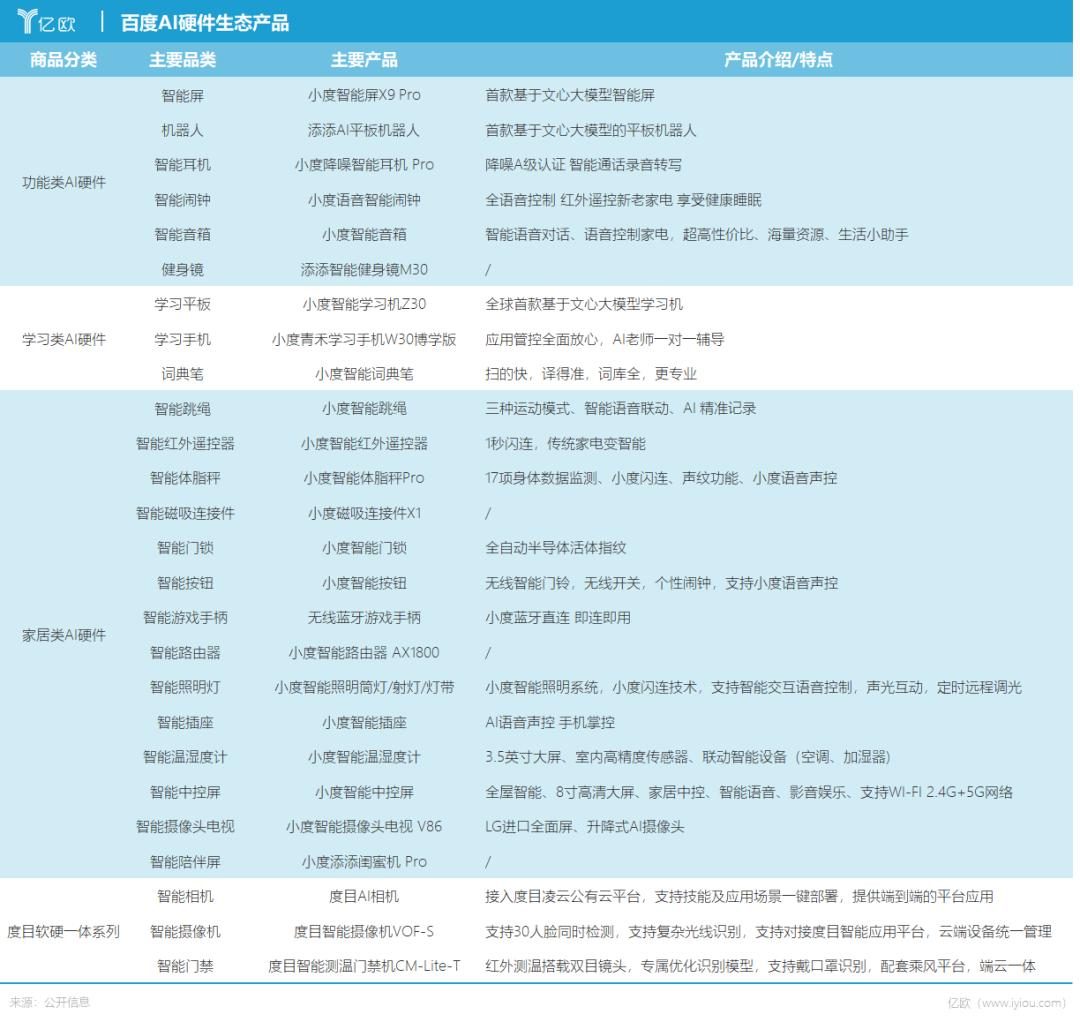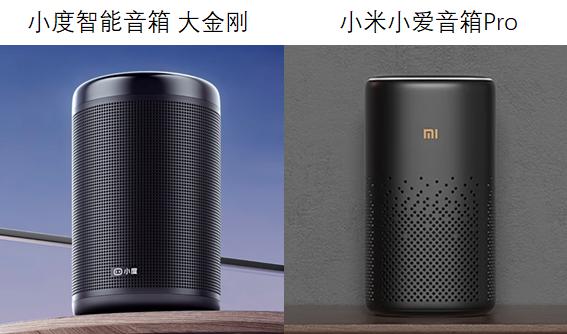Does smart hardware seem to be viable again in 2024?
Ignoring the market performance, judging from the front-runner's actions, this is indeed the case.
According to Yiou.com statistics, from 2023 to now, in about a year and a half, at least 25 executives from major manufacturers have joined the AI hardware track. In terms of origin, most of them come from major Internet companies such as BAT and TMD.
Amid the surge of large models, with the support of AI, AI mobile phones, AI PCs, AI glasses, AI headphones, and AI toys are becoming very popular.
What’s interesting is that among the many major Internet companies, Baidu’s performance is worth observing.
Baidu, as one of the first established Internet giants to enter the hardware market, is still "still on the table". From the time span and adjustment of Baidu's layout hardware direction, we can get a glimpse of the changes in the entire smart hardware industry.
At present, Xiaodu Technology is the main business line responsible for Baidu's layout in the field of AI hardware. However, before 2020, Xiaodu Technology's position in Baidu's business system is not obvious.
In fact, in the past ten years, Baidu's business system has undergone several adjustments. Before 2013, Baidu was mainly divided into four major businesses: sales system, commercial operation system, user products and technology system, and commercial products and technology system. line; in 2013, it was adjusted into four major business groups: mobile services business group, emerging business group, search business group, and financial services business group.
2020 is the year of the largest organizational structure adjustment since Baidu's transformation. At that time, Baidu established three major business systems: internal business groups, external mergers and acquisitions enterprise systems, and internal incubation or control rights acquisition systems through investment. At that time, Xiaodu also was included in the latter's business system.
Baidu’s move has obvious intentions, and the purpose is to highlight the strategic position of “artificial intelligence”. Unfortunately, even though Baidu has been strategically All in artificial intelligence since 2020, the reality is that currently, Baidu’s performance in many popular AI hardware segments is still unsatisfactory.
One has to guess whether it is the swing in hardware positioning and strategic focus that has led to the lack of “dazzling” products .
For many years, Baidu's core strategy has been focused on AI technology research and development and software services, rather than hardware production itself. Baidu often regards hardware products as carriers of AI technology rather than independent commercialization cores . Compared with companies such as Apple and Huawei that regard hardware as the core of their business, Baidu may have relatively insufficient resources and strategic emphasis on hardware products .
From an external perspective, Baidu prefers to cooperate with third-party hardware manufacturers through its AI platform rather than leading hardware R&D and production on its own. Although its openness and inclusiveness are well received by upstream and downstream users, it also leads to a certain extent that Baidu's hardware products are more used as "accessories" to demonstrate its AI capabilities, rather than directly gaining market share and user stickiness through hardware .
Secondly, it is obvious that compared with smart hardware giants, although there are many products, they lack a complete hardware ecosystem. Competition in the hardware field is fierce, and consumers tend to choose ecological brands with ecological stickiness and a large number of commonly used products, such as Xiaomi, Apple, Huawei, etc.
Perhaps the outside world’s impression of Baidu is still stuck in the stereotype of a large Internet company, a search company, and an advertising company. But in fact, a surprising fact is that Baidu entered the AI hardware market very early. After nearly ten years of accumulation, , a large number of smart hardware have been quietly launched.
In Baidu's business system, the department responsible for the AI hardware business is mainly Xiaodu Technology, which specializes in developing AI hardware products. Not long ago, Baidu Vice President and Xiaodu CEO Li Ying introduced Xiaodu Technology, saying that its strategic positioning is "AI + hardware".
In the field of AI hardware, Xiaodu has been exploring for many years. As early as 2017, it launched Xiaodu Assistant version 1.0. According to the latest disclosure, Xiaodu just released the DuerOS X system in April this year, which Xiaodu claims to be the world’s first AI native operating system.
Currently, in terms of AI hardware, Xiaodu has launched intelligent hardware products in more than ten sub-sectors, covering smart home, smart education, film and television entertainment, intelligent robots and other directions.
According to public information, Yiou.com has sorted out the AI hardware products that Baidu has launched (see the picture below). For ease of observation, Yiou.com has divided these hardware products into three categories: functional, learning, and home.

It is easy to see from the picture above that Baidu has a very extensive layout in the field of AI hardware, especially in the smart home field, covering almost all aspects of home life. Its products include smart lighting, smart sockets, smart door locks, and smart thermometers and hygrometers. , smart remote control, smart TV, etc.
In addition to home smart hardware, Baidu has also launched learning smart hardware such as learning machines, learning tablets, and dictionary pens, as well as functional hardware products such as smart headphones, smart speakers, and smart fitness mirrors.
But I have to mention that in addition to performance, products for the C-side are also particularly important in terms of innovative design. Baidu's hardware products lack obvious differentiation in design and user experience . Baidu mainly focuses on embedding AI technologies such as DuerOS into hardware, but it is relatively conservative in appearance design and innovative experience , and does not bring an obvious sense of "surprise" to consumers.

Although products like Xiaodu smart speakers have certain competitiveness relying on Baidu's AI capabilities, they are not fundamentally different from other similar products on the market in terms of innovation. Users can easily choose mature products such as Xiaomi's which are more cost-effective.
Looking at the timeline, Baidu has been exploring the field of AI hardware for nearly ten years. Whether it is self-developed products, investment in mergers and acquisitions, or cooperation with external parties, Baidu has invested a lot of manpower, time, and money in AI hardware products. It is undeniable that some products have gained market recognition, such as smart fitness mirrors, smart learning machines and other products that have a certain market share.
Although there are enough products, there is often a lack of consistent user experience across different devices. Due to the diverse sources of products in its ecosystem, some from self-research and some from mergers and acquisitions or cooperation, Baidu is difficult to provide users with a completely unified and smooth cross-device experience .
This inconsistency in experience also makes it difficult for users to maintain consistency and coherence when switching devices, resulting in a weakened ecological appeal and a weak market voice.
In fact, from the perspective of AI hardware product layout, it is difficult to say that it is satisfactory, and it can even be said that the performance is mediocre. An indisputable fact is that Baidu is almost absent from the most popular products such as AI glasses, AI headphones, AI headsets, and AI wearable devices.
Previously, Baidu once set up an emerging business group, but now, as of now, Baidu may still have not grasped the emerging AI hardware trend. It can even be said that many of the previously launched hardware products have "always followed, never led."
Overall, Baidu has launched a large number of AI hardware in recent years, covering a wide range of areas. But in fact, when competing with its opponents, Baidu lacks AI products that can "seal the throat with one sword" and no products that can truly "fight". Precisely because of this, the outside world's stereotype of Baidu is still that "Baidu is the leader in AI hardware." Being left behind.”
In fact, for AI hardware companies, whether they are large manufacturers or small companies, in terms of product layout, "more and more is worse than less and more refined". When you have strong competitiveness and gain a certain market position, it may not be a bad idea to expand into other areas.
There is a consensus in the industry that this year is the "first year of AI hardware", with AI glasses, AI headphones and other products in full swing. Not long ago, Zuckerberg just released what he calls “the most powerful AI glasses on earth.” It can be predicted that in the future, AI hardware will be a key area pursued by major manufacturers, and the market competition will become more intense.
Baidu's core competitiveness lies in AI algorithms and platforms, while hardware is an area that requires different technologies and resources. To successfully launch AI hardware products, it is necessary to find a suitable integration point between hardware and software. If Baidu hopes to achieve a significant breakthrough in the hardware field, it may have to focus more on hardware design innovation, marketing and ecosystem construction to further enhance its hardware products. competitiveness in the market .
There is not much time left for Baidu.